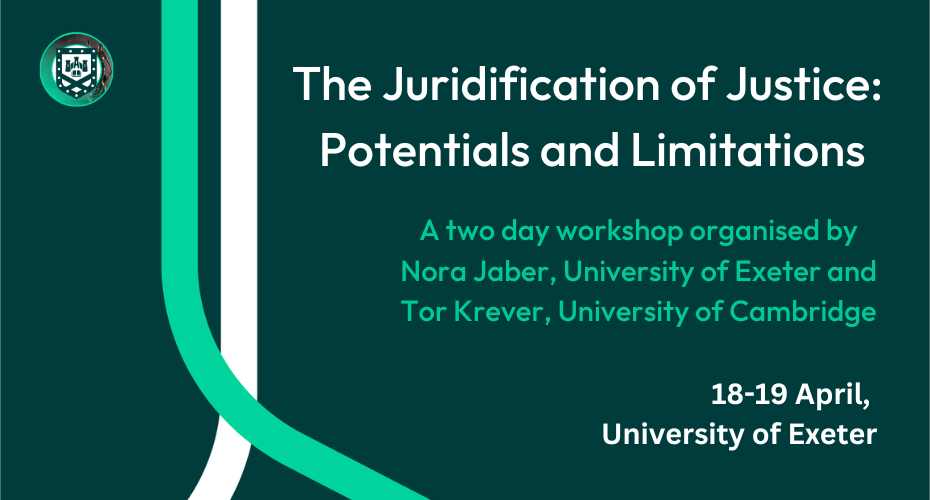
Posted by The Law School
9 January 2024Organised by Nora Jaber (University of Exeter) and Tor Krever (University of Cambridge)
Calls for justice are increasingly articulated in the language of human rights and legality, injustice framed in turn as an issue of illegality. The crystallisation of legality as the vernacular of justice movements can be seen at both the domestic and international level—the proliferation of ‘rights talk’ and turn to litigation by social movements in national courts; global injustice challenged in the language of international law and international justice increasingly synonymous with international criminal justice. Courts and international legal fora have become the privileged sites in which political demands are articulated and battles over rights and legality are fought and settled. The connection between political demands for justice and their articulation in and through the language of rights and legality is often taken for granted. These developments have received only limited scrutiny, their domestic and international dimensions rarely analysed as part of the same phenomenon. Nor has the historical specificity of these developments received sufficient attention.
This workshop aims to bring together scholars whose work concerns and interrogates various aspects of this ‘juridification of justice’. What, if any, forces or world-historical transformations undergird and explain the distinctiveness and growing prominence of the ‘juridification of justice’ today? Has the meaning of justice itself—always a contested concept—changed? In what ways has it come to be associated with legal justice, and to what effect? The workshop offers an opportunity to question and explore the relationship between conceptions of justice and law in diverse contexts and across time. Collectively, we seek to assess what is gained—but also potentially lost—through the juridification of political demands for justice. Under what circumstances can (and have) rights/legality be(en) mobilised in pursuit of justice? When might such framing weaken or depoliticise such demands, potentially collapsing conceptions of justice into mere calls for legal remedies?
While the workshop theme remains broad, we invite participants to bring specific examples from their own work to collectively assess how these historical and contemporary case studies can best inform new strategies of social transformation and to evaluate the uses and limits of rights/legality within such strategies. Struggles for justice from the margins, in particular, are not always articulated in the language of legality. We are particularly interested in contributions that probe the limits of legal frameworks in capturing the plight of the most marginalised and reflect their perspectives.
We invite contributions that address questions including, but not limited to, the following:
We invite abstracts of no more than 500 words to be submitted by 26 January 2024. You will be notified of our decision by 9 February 2024. We aim for this workshop to be the first step toward the development of a collaborative socio-legal research network on the ‘juridification of justice’. We will collectively discuss further steps at the workshop.
The 2-day workshop will be convened on 18-19 April 2024 at the University of Exeter. Hybrid option will be considered to accommodate those who are unable to attend in person. For those who cannot benefit from institutional support, we have funding available to cover travel and accommodation. We will prioritise early career researchers, unaffiliated scholars, and scholars from the Global South in allocating funds.
Please send your abstracts to n.jaber3@exeter.ac.uk and tkk24@cam.ac.uk